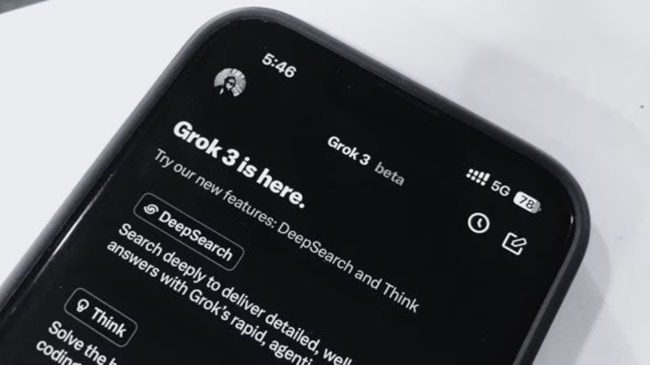Opinion There is nothing to celebrate in Grok’s response. Humane touch is more important than AI
I have no hesitation in saying that I would give more importance to the ground reporting and analytical skills of a hard-working/intellectually alert journalists than what “Grok” or AI can present before me within a fraction of a second.
 Grok’s new vision feature lets users point their phone camera at real-world objects and get instant AI-powered insights. (Express photo)
Grok’s new vision feature lets users point their phone camera at real-world objects and get instant AI-powered insights. (Express photo) “To me every hour of the light and dark is a miracle”, wrote Walt Whitman. Yet, I am not very sure whether these days you and I can appreciate this extraordinarily rich poetic wisdom unless the much-hyped artificial intelligence approves it. Is it that we have already begun to attach more importance to AI than to our own creative agency or critical faculty? Think of, for instance, the way some of our honest/bold journalists are celebrating Grok, Elon Musk’s AI invention, as it seems to be agreeing with what they have been saying on their YouTube channels — critiquing the ruling regime, the ugly communalisation of Indian society, and the normalisation of the politics of hatred. What really puzzles me is that even these hard-working, creative and courageous journalists have to eventually legitimise their achievements through AI. Does it indicate that in the coming years we might lose faith in our humaneness — our vulnerability, creativity and moral judgment — as AI is going to be overwhelmingly powerful?
Well, I know that for most of us it is not easy to interrogate the hegemonic power of techno-science. In fact, this hegemony is so overwhelming that even the slightest ambiguity towards it is seen to be a sign of intellectual poverty or backwardness. And it is, therefore, not surprising that there is much hype over AI. Possibly, like every new technology, AI too will have many achievements, or positive things to offer — say, in the realm of medical sciences. However, if AI is allowed to alter what it means to be humane, we need to be cautious. It is in this context that I will make three observations.
First, I wish to assert that human “imperfection” is preferable to robotic or technocratic “perfection”. Imagine a situation. AI has come forward with a short story that seems to be “better” than Franz Kafka’s The Metamorphosis, or a book of poetry that is more nuanced than Rabindranath Tagore’s Gitanjali. Yet, the fact is that AI cannot experience what Kafka or Tagore passed through — their pain and anguish, or reflexivity and self-churning. In other words, AI cannot feel what it means to be humane, even if it comes forward with “perfect” poems, novels or songs. It is great to be emotionally vulnerable and “imperfect”. If we surrender before the mythology of robotic “perfection”, we might lose the spirit of what it means to be humane. Hence, I have no hesitation in saying that I would give more importance to the ground reporting and analytical skills of a hard-working/intellectually alert journalists than what “Grok” or AI can present before me within a fraction of a second. It is for the same reason that, as a teacher, I would always appreciate a student’s “imperfect” essay; and it is quite unlikely that I would be impressed by an AI-generated “perfect” essay.
Second, even when the hegemony of science — and that too, pampered by techno-fascists — tends to hypnotise us, it has become immensely important to retain our critical enquiry, our ability to see beyond the euphoria over new technology. Think of the grand promise of the Industrial Revolution and emergent capitalism. Not many agreed with the likes of Gandhi, Thoreau and Ruskin when they began to tell us that not everything was rosy about the Industrial Revolution and its gospel of unlimited economic growth and manipulation of natural resources. But today, as the horror of the climate emergency is felt everywhere, we are realising that those creative dissenters were not altogether wrong in their critique of the triumphant agenda of industrial capitalism. Likewise, our initial enthusiasm over the grand promise of algorithms and social media seems to be over as we are seeing the spread of fake news, or a new kind of neurosis among children and adolescents in their psychic violence, their attention deficiency, and steady withdrawal from direct/face-to-face social interaction.
And third, even if AI has something positive to offer, it is important to be alert and cautious. I entirely agree with Harvard professor Michael Sandel’s prophetic insights: If we do not assert our agency and creativity, AI can cause severe ethical concern for society — privacy and surveillance, bias and discrimination, and perhaps the deepest, most difficult philosophical question of the era, the role of human judgement. Is it the reason Israeli historian Yuval Noah Harari is urging us not to summon a power we can’t control? As Harari reminds us in his new book, Nexus, “AI is an unprecedented threat to humanity because it is the first technology in history that can make new decisions and create new ideas by itself.” Even in the embryonic stage of the AI revolution, says Harari, “computers already make decisions about us — whether to give us a mortgage, to hire us for a job, to send us to prison”. Meanwhile, generative AIs like GPT-4 already create new stories, poems and images. Indeed, if not controlled, AI will make it more difficult to understand our own lives.
When do we wake up?
Avijit Pathak writes on culture and education






